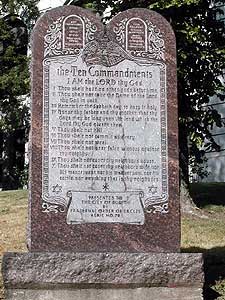|
Photos
Resources
Your Voice
|
Supreme Court jumps into Ten Commandments issue
October 12, 2004
Washington, D.C. — (AP) - The U.S. Supreme Court said Tuesday it will take up the constitutionality of Ten Commandments displays on government land and buildings, a surprise announcement that puts justices in the middle of a politically sensitive issue.
Justices have repeatedly refused to revisit issues raised by their 1980 decision that banned the posting of copies of the Ten Commandments in public school classrooms.
In the meantime, lower courts have reached a hodgepodge of conflicting rulings that allow displays in some instances but not in others.
The high court will hear appeals early next year involving displays in Kentucky and Texas.
In the Texas case, the justices will decide if a Ten Commandments monument on the state Capitol grounds is an unconstitutional attempt to establish state-sponsored religion.
A homeless man, Thomas Van Orden, lost his lawsuit to have the 6-foot tall red granite removed. The Fraternal Order of Eagles donated the monument to the state in 1961. The group gave scores of similar monuments to American towns during the 1950s and '60s, and those have been the subject of multiple court fights.
Separately, the justices will consider whether a lower court wrongly barred the posting of the Ten Commandments in Kentucky courthouses.
|
The Ten Commandments case could be the blockbuster religious liberty case that the Supreme Court has seen in a really long time.
- Mathew Staver of the conservative law group Liberty Counsel |
McCreary and Pulaski county officials hung framed copies of the Ten Commandments in their courthouses and later added other documents, such as the Magna Carta and Declaration of Independence, after the display was challenged.
The legal debate over Ten Commandments monuments has been playing out in several communities in the upper Midwest as well. In Duluth, Minnesota, the city recently removed a Ten Commandments monument from the grounds of City Hall, after a lawsuit was filed by opponents.
The case against the city of La Crosse, Wisconsin, is still pending. City officals have appealed a recent court ruling requiring it to remove a monument from a city park. The case is now before the 7th Circuit Court of Appeals in Chicago, according to city attorney Patrick Houlihan.
The La Crosse case is somewhat different, in that the city sold the small piece of land on which the monument sits to the local Eagles Club, a private entity. A federal judge ruled nonetheless that the monument must be removed. Houlihan expects a ruling from the appeals panel within the next few months.
In Fargo, North Dakota, a group of residents raised concerns about a Ten Commandments display on public property near City Hall. But no legal action has been taken, and city officials have said they will wait for a Supreme Court decision before deciding whether to take action.
"The Ten Commandments case could be the blockbuster religious liberty case that the Supreme Court has seen in a really long time," said Mathew Staver of the conservative law group Liberty Counsel, who represents the Kentucky counties. "It's finally here."
Last week, the justices rejected an appeal from a high-profile crusader for Ten Commandment monuments, ousted Alabama Chief Justice Roy Moore, who lost his job after defying a federal order to dismantle a Ten Commandments monument.
Staver said some courts have allowed monuments, others have ordered their removal. A divided appeals court panel sided with the American Civil Liberties Union in the Kentucky case.
"It's part of our American heritage. People are upset when they see that being removed," Staver said.
The Rev. Barry W. Lynn of Americans United for Separation of Church and State said Tuesday that he hopes the court uses the cases to declare government displays of religious documents and symbols unconstitutional.
"It's clear that the Ten Commandments is a religious document. Its display is appropriate in houses of worship but not at the seat of government," Lynn said.
The Ten Commandments contain both religious and secular directives, including the familiar proscriptions on stealing, killing and adultery. The Bible says God gave the list to Moses.
The Constitution bars any state "establishment" of religion. That means the government cannot promote religion in general, or favor one faith over another.
In the past decade, justices have refused to get involved in Ten Commandments disputes from around the country. Three conservative justices complained in 2001, when the court declined to rule on the constitutionality of a Ten Commandments display in front of the Elkhart, Ind., Municipal Building.
Chief Justice William H. Rehnquist, joined by Justices Antonin Scalia and Clarence Thomas, said the city sought to reflect the cultural, historical and legal significance of the commandments. Rehnquist noted that justices' own chambers includes a carving of Moses holding the Ten Commandments.
The cases are Van Orden v. Perry, 03-1500, and McCreary County v. ACLU, 03-1693.
(Copyright 2004 by The Associated Press. All Rights Reserved.)
|
News Headlines
|
Related Subjects
|

